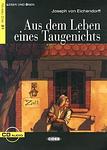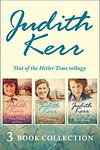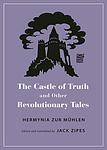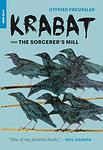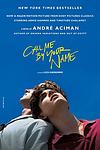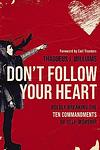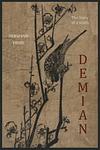The Greatest Italian, German "Coming of age" Books of All Time
Click to learn how this list is calculated.
This list represents a comprehensive and trusted collection of the greatest books. Developed through a specialized algorithm, it brings together 300 'best of' book lists to form a definitive guide to the world's most acclaimed books. For those interested in how these books are chosen, additional details can be found on the rankings page.
Genres
The "Coming of age" category of books typically refers to stories that explore the transition from adolescence to adulthood. These books often focus on the challenges and experiences that young people face as they navigate the complexities of growing up, including issues such as identity, relationships, sexuality, and personal growth. Coming of age stories can be set in any time period or cultural context, and may feature protagonists of any gender, race, or background. Overall, the genre offers readers a glimpse into the universal struggles and triumphs of youth, and the process of becoming a fully realized adult.
Countries
Date Range
Reading Statistics
Click the button below to see how many of these books you've read!
Download
If you're interested in downloading this list as a CSV file for use in a spreadsheet application, you can easily do so by clicking the button below. Please note that to ensure a manageable file size and faster download, the CSV will include details for only the first 500 books.
Download-
1. The Magic Mountain by Thomas Mann
In this novel, the protagonist, a young, ordinary man, visits his cousin at a tuberculosis sanatorium in the Swiss Alps. Intending to stay for only a few weeks, he ends up remaining there for seven years, becoming a patient himself. The book explores his experiences and relationships with other patients and staff, delving into philosophical discussions on life, time, and the nature of disease. It also provides a vivid portrayal of the European society and intellectual life on the eve of World War I.
-
2. The Notebooks of Malte Laurids Brigge by Rainer Maria Rilke
"The Notebooks of Malte Laurids Brigge" is a semi-autobiographical novel narrated by a young man from Denmark living in Paris, who is trying to understand the world and his place in it. The protagonist is a poet and a dreamer, who spends his time observing and reflecting on the people and situations around him. The book is a collection of his thoughts, observations, and musings, which often revolve around themes of death, solitude, history, and the nature of existence. It's a deep and introspective exploration of the human condition and the nature of creativity.
-
3. The Book Thief by Markus Zusak
Set in Nazi Germany during World War II, the novel follows the story of a young girl who finds solace in stealing books and sharing them with others. In the midst of the horrors of war, she forms a bond with a Jewish man her foster parents are hiding in their basement. The story is narrated by Death, offering a unique perspective on the atrocities and small acts of kindness during this period. The girl's love for books becomes a metaphor for resistance against the oppressive regime.
-
4. The Garden of the Finzi-Continis by Giorgio Bassani
Set in Ferrara, Italy during the late 1930s, the book tells the story of the Finzi-Continis, a wealthy, aristocratic Jewish family who live in a secluded mansion with a beautiful, walled garden. The narrator, a young middle-class Jew, becomes infatuated with the family's daughter, Micoleta. As the Fascist regime's anti-Jewish laws become increasingly oppressive, the idyllic garden becomes a sanctuary for the local Jewish community, including the narrator. Despite the looming threat of the Holocaust, the family remains oblivious to their impending fate, leading to a tragic end.
-
5. The Moon and the Bonfires by Cesare Pavese
The story follows a man who, after making a fortune in America, returns to his small hometown in Italy after World War II. He finds the place significantly changed, with many of his old friends either dead or drastically different. As he tries to reconcile his memories with the new reality, he also grapples with his own identity and the impact of the war on his home. The narrative explores themes of change, identity, and the lasting effects of war.
-
6. The Reader by Bernhard Schlink
"The Reader" is a poignant narrative centered around a young German boy's complex relationship with an older woman, who later turns out to be a former Auschwitz guard. Their relationship begins with her teaching him to read, but takes a drastic turn when she disappears, only to reemerge on trial for war crimes. The novel explores themes of guilt, shame, and redemption, as the boy, now a law student, grapples with his feelings for a woman he once loved, but whose past actions he cannot reconcile with.
-
7. Wilhelm Meister's Apprenticeship by Johann Wolfgang von Goethe
"Wilhelm Meister's Apprenticeship" is a classic coming-of-age story that follows the protagonist, Wilhelm, through his journey of self-discovery. Caught between his bourgeois background and his aspirations to become an actor, Wilhelm embarks on an odyssey that introduces him to a variety of characters and experiences. The novel explores themes of love, loss, and the pursuit of artistic excellence, while also critiquing the social norms and expectations of the time.
-
8. The Life of a Good-For-Nothing by Joseph von Eichendorff
The book tells the story of a young, carefree gardener's son who is deemed a "good-for-nothing" by his father due to his dreamy and idle nature. Spurred by his desire for adventure and romantic yearnings, he leaves home to embark on a whimsical journey across various regions. Along the way, he encounters a series of picturesque and often mysterious characters and situations, which lead him through a series of adventures that ultimately guide him towards self-discovery and maturity. His travels and the people he meets help him realize the value of love, work, and purpose in life.
-
9. My Brilliant Friend by Elena Ferrante
This novel tells the story of two friends, Elena and Lila, growing up in a poor neighborhood in Naples, Italy in the 1950s. Their intense, complicated friendship is marked by competition, mutual respect, and deep affection. As they navigate the challenges of adolescence, including family drama, academic struggles, and romantic entanglements, their bond is tested and transformed. The narrative explores themes of female friendship, social class, education, and the struggle for personal autonomy in a patriarchal society.
-
10. Demian by Hermann Hesse
The novel follows the life of a young man, Emil Sinclair, from childhood to adulthood, as he navigates the duality of his nature and the societal expectations of his time. He is influenced by a charismatic and intellectual peer, Max Demian, who introduces him to the concept of the world not as a dichotomy of good and evil, but as a unified whole. This leads Sinclair on a journey of self-discovery and spiritual enlightenment, exploring themes of identity, morality, and the subconscious. The narrative is heavily influenced by the philosophies of Carl Jung and the Gnostic tradition.
-
11. Momo by Michael Ende
"Momo" by Michael Ende is a captivating tale about a young orphan girl named Momo who possesses an extraordinary ability to listen and understand people. Set in a town plagued by time thieves, Momo's unique gift becomes crucial as she embarks on a quest to save the community from losing their most precious possession: time. With the help of her loyal friends, Momo must confront the enigmatic Men in Grey and their sinister plan to rob people of their time, teaching readers the importance of cherishing the present moment and the power of human connection.
-
12. Family Sayings by Natalia Ginzburg
"Family Sayings" is a semi-autobiographical novel that explores the author's experiences growing up in a large Jewish-Italian family in the pre and post-World War II era. The narrative is a collection of family anecdotes, sayings, and stories that illustrate the dynamics, relationships, and history of the family. The book also provides a glimpse into the political and social changes in Italy during this period, including the rise of fascism and the impact of the war. The author's poignant and evocative storytelling brings to life a world that is both deeply personal and universally relatable.
-
13. Spring Awakening by Frank Wedekind
The book is a provocative and controversial play that delves into the tumultuous emotional landscape of adolescence. Set in late 19th-century Germany, it follows a group of teenagers as they navigate the complexities of sexuality, authority, and rebellion. The narrative exposes the repressive and hypocritical nature of the society that stifles the natural desires and questions of the young characters, leading to tragic consequences. Through its candid exploration of themes such as sexual awakening, suicide, abortion, and the critique of the educational system, the play challenges the audience to confront the damaging effects of ignorance and the urgent need for open communication and understanding between generations.
-
14. The Young Man by Botho Strauß
"The Young Man" is a philosophical novel that explores the transformation of a young man from a passive observer to an active participant in life. The protagonist, initially a detached observer of his own life and the world around him, is forced to confront his own existence and identity when he falls in love. The narrative delves into his introspective journey, his struggle with societal norms, his search for meaning and purpose, and his ultimate acceptance of his own individuality and humanity.
-
15. The Neapolitan Novels by Elena Ferrante
"The Neapolitan Novels" is a four-part series that explores the intricate and lifelong friendship between two women from Naples, Italy. The series spans several decades, beginning in the 1950s, and provides a detailed examination of the women's lives, struggles, and the societal pressures they face. The narrative delves into themes of identity, friendship, love, violence, and socio-political changes in post-war Italy. The series is known for its rich character development and vivid portrayal of female friendship.
-
16. When Hitler Stole Pink Rabbit by Judith Kerr
"When Hitler Stole Pink Rabbit" is a poignant and autobiographical novel that follows the life of a young Jewish girl named Anna and her family as they flee Germany in the 1930s to escape the rise of the Nazi regime. Through Anna's eyes, the book explores the challenges and hardships faced by refugees, as well as the loss of identity and sense of belonging. It is a touching story of resilience, courage, and the power of family bonds in the face of adversity.
-
17. The Black Brothers by Lisa Tetzner
"The Black Brothers" is a captivating historical novel set in 19th-century Switzerland. It tells the story of four brothers, who, due to unfortunate circumstances, are forced to work as chimney sweeps. Through their perseverance and unity, they navigate the harsh realities of their profession and form a strong bond with each other. The book explores themes of resilience, friendship, and the fight for justice, making it a compelling and heartwarming read.
-
18. Krabat by Otfried Preußler
The book is a dark fantasy novel set in 17th-century Germany, where a young orphan named Krabat is lured to a mysterious mill that he discovers is a school for black magic. The mill is run by a foreboding master who teaches Krabat and other boys the dark arts, but at a sinister cost. As Krabat becomes more skilled in sorcery, he realizes that the mill harbors dark secrets and that escape might be a matter of life and death. He must use his wits and newfound powers to break free from the master's malevolent grip and save his fellow apprentices from a doomed fate. The story is a blend of folklore, coming-of-age, and the struggle between good and evil.
-
19. I'm Not Scared by Niccolò Ammaniti
Set in a small Italian village during the scorching summer of 1978, this novel tells the story of a 9-year-old boy who discovers a horrific crime being hidden by the adults in his community. The boy, while exploring an abandoned farmhouse, stumbles upon a young boy being held captive in a hole. As he tries to help the captive boy, he is forced to face the moral complexities of his world and the terrifying realization that his own father might be involved in this cruel act. The story is a poignant exploration of innocence, friendship and the loss thereof, and the harsh realities of adulthood.
-
20. Floating In My Mother's Palm by Ursula Hegi
The book is a poignant coming-of-age story set in a post-war German town, where a young girl navigates the complexities of her family life and the secrets of her community. Through her eyes, readers experience her relationships with colorful local characters, her discovery of love and loss, and her quest for identity amidst the lingering shadows of World War II. The narrative is a tapestry of small-town life, capturing the essence of growth and the bittersweet nature of memory, as the protagonist learns about the resilience of the human spirit and the fluidity of time, much like floating in the comforting yet unpredictable embrace of her mother's palm.
-
21. Call Me By Your Name by André Aciman
The novel is a poignant exploration of desire, passion, and the confusion of young love, set during a sun-drenched summer on the Italian Riviera. It follows the blossoming romantic relationship between a precocious 17-year-old boy and a visiting 24-year-old American scholar staying at his parents' villa. As they bond over literature, music, and the languid Italian landscape, their intimacy grows, leading to a deep and transformative affair that will leave an indelible mark on their lives. The story delves into the complexities of emotions and the heartache of remembering a once-in-a-lifetime connection that both defines and haunts them.
-
22. Follow Your Heart by Susanna Tamaro
"Follow Your Heart" is a poignant epistolary novel that delves into the themes of self-discovery, family secrets, and the unbreakable bonds between generations. The story unfolds through a series of letters written by an elderly Italian woman to her granddaughter, who has moved to America. In these letters, she shares her life's wisdom, reflects on her past experiences, and reveals long-held secrets. The narrative explores the choices she made, the consequences of those choices, and the lessons she learned along the way. It is a heartfelt meditation on love, loss, and the importance of following one's own heart in the face of societal expectations and personal doubts.
-
23. Die neuen Leiden des jungen W. by Ulrich Plenzdorf
This novel tells the story of a young man from East Germany who rebels against the societal norms and expectations of his time. The protagonist, a skilled worker, flees from his apprenticeship and his home to Berlin, where he isolates himself in a summer house, devoting his time to his passions of reading and listening to Western music. Using the narrative style of a psychological confession, the book explores themes of youthful rebellion, the search for identity, and the conflict between individual desires and societal pressures. The protagonist's tragic end underlines the oppressive nature of the East German regime.
-
24. Beneath The Wheel by Hermann Hesse
"Beneath The Wheel" follows the story of Hans Giebenrath, a talented and ambitious young student who is sent to a prestigious boarding school. As he becomes consumed by the pressures of academic success and the expectations of his teachers and parents, Hans gradually loses touch with his own desires and passions. The novel explores themes of conformity, the damaging effects of excessive pressure, and the consequences of sacrificing one's individuality for societal approval.
-
25. The Beautiful Summer by Cesare Pavese
This novel captures the essence of youthful awakening set against the backdrop of an Italian summer. It follows the story of a young girl, on the cusp of womanhood, as she navigates the complexities of love and desire. Through her eyes, readers experience the intoxicating freedom of summer and the bittersweet realities of growing up. The narrative beautifully intertwines themes of innocence, passion, and the inevitable loss of innocence, offering a poignant exploration of the transition from adolescence to adulthood. The vivid setting and emotionally rich journey make it a timeless tale of personal discovery and the universal experience of coming of age.
Reading Statistics
Click the button below to see how many of these books you've read!
Download
If you're interested in downloading this list as a CSV file for use in a spreadsheet application, you can easily do so by clicking the button below. Please note that to ensure a manageable file size and faster download, the CSV will include details for only the first 500 books.
Download






